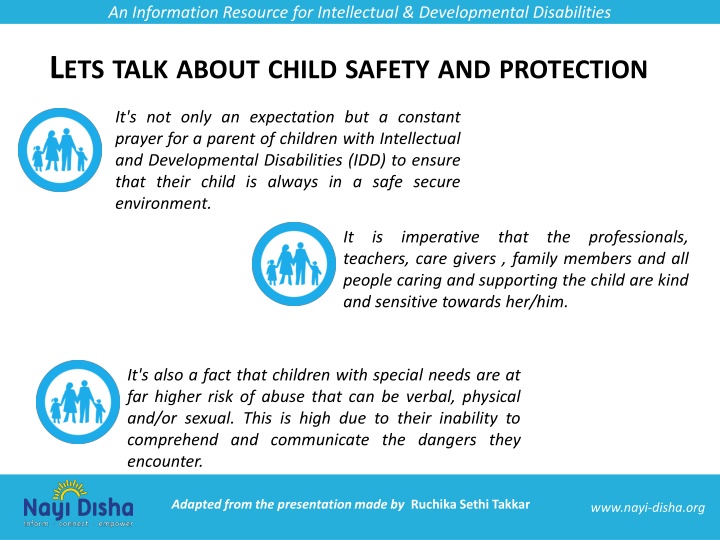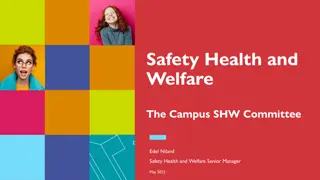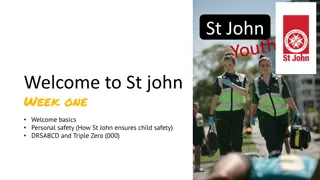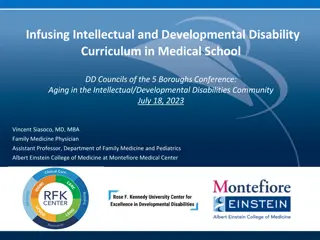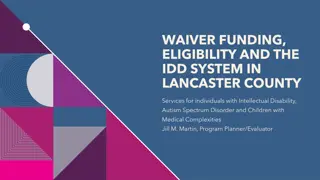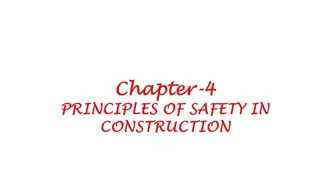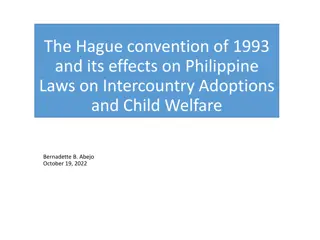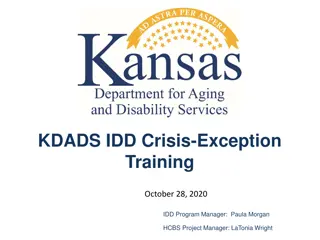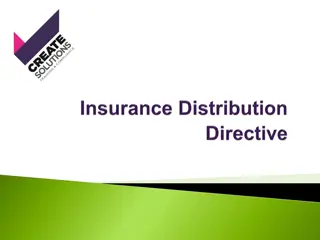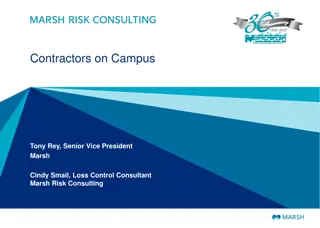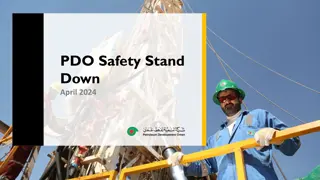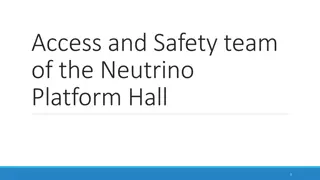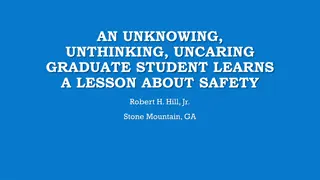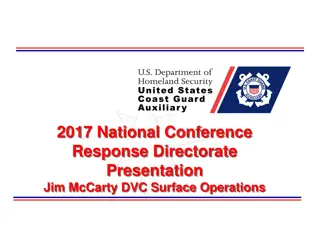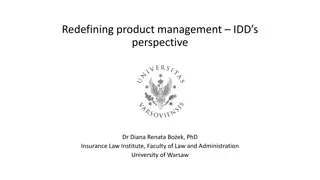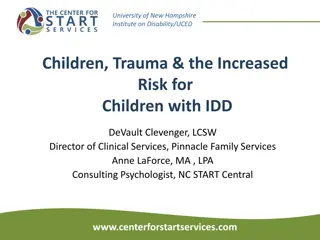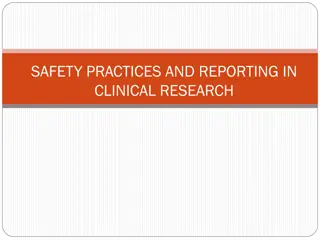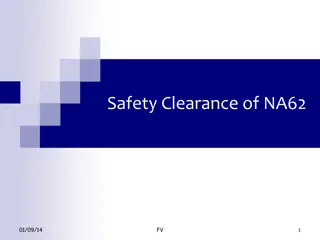Ensuring Child Safety for Individuals with IDD
Parents of children with Intellectual and Developmental Disabilities (IDD) face the constant challenge of keeping their child safe due to unique risks of abuse. Individuals with IDD may struggle with self-awareness, communication, and understanding personal safety, making them vulnerable. Lack of mobility and social isolation further increase the risk. Compromised safety can lead to various negative psychological impacts. Awareness, sensitivity, and proactive measures are crucial in protecting children with IDD.
Download Presentation

Please find below an Image/Link to download the presentation.
The content on the website is provided AS IS for your information and personal use only. It may not be sold, licensed, or shared on other websites without obtaining consent from the author.If you encounter any issues during the download, it is possible that the publisher has removed the file from their server.
You are allowed to download the files provided on this website for personal or commercial use, subject to the condition that they are used lawfully. All files are the property of their respective owners.
The content on the website is provided AS IS for your information and personal use only. It may not be sold, licensed, or shared on other websites without obtaining consent from the author.
E N D
Presentation Transcript
An Information Resource for Intellectual & Developmental Disabilities LETSTALKABOUTCHILDSAFETYANDPROTECTION It's not only an expectation but a constant prayer for a parent of children with Intellectual and Developmental Disabilities (IDD) to ensure that their child is always in a safe secure environment. It is imperative that the professionals, teachers, care givers , family members and all people caring and supporting the child are kind and sensitive towards her/him. It's also a fact that children with special needs are at far higher risk of abuse that can be verbal, physical and/or sexual. This is high due to their inability to comprehend and communicate the dangers they encounter. Adapted from the presentation made by Ruchika Sethi Takkar www.nayi-disha.org
An Information Resource for Intellectual & Developmental Disabilities WHY TALKABOUTCHILDSAFETYANDPROTECTION INDIVIDUALSWITH IDD CANBE VICTIMSOFABUSEBECAUSE - There are unique aspects of their disability that may hinder with self-awareness of danger Most individuals with IDD have poor communication skills/limited verbal ability They may have a limited sense of danger They may have a limited sense of personal safety They may have a limited understanding of sexuality or sexual behaviour They may engage in self-touch that can be misconstrued as consent to be touched Adapted from the presentation made by Ruchika Sethi Takkar www.nayi-disha.org
An Information Resource for Intellectual & Developmental Disabilities WHY TALKABOUTCHILDSAFETYANDPROTECTION INDIVIDUALSWITH IDD MIGHTBEATAFARHIGHERRISKBECAUSEOF - They may be looking for affection due to their social isolation and become easy targets of abuse Lack of mobility High reliance on adults for many of their needs Of multiple people involved in their care, such as a variety of caregivers. Their dependency on others for their intimate care such as dressing and toileting needs They have learnt to passively obey adults, especially carers and adults in authority and hence may not recognise, resist and report any abuse Adapted from the presentation made by Ruchika Sethi Takkar www.nayi-disha.org
An Information Resource for Intellectual & Developmental Disabilities WHATHAPPENSWHENCHILDSAFETYISCOMPROMISED? ANYFORMOFABUSEORTHREATORBEINGINAPLACEWHICHISNOTSAFECREATES - POORSELF-CONFIDENCE LOWSELF-ESTEEM FEELINGSOFISOLATION POWERLESSNESS ANXIETY FEAR FRUSTRATION LIMITEDASSERTIVENESS EXAGGERATEDBEHAVIOURS/AGGRESSION Adapted from the presentation made by Ruchika Sethi Takkar www.nayi-disha.org
An Information Resource for Intellectual & Developmental Disabilities PREVENTIVEMEASURESTOENSURECHILDPROTECTION WORKTOCREATEASAFEZONEWHEREEVERYOURCHILDIS EVERYSCHOOL, THERAPYCENTRE, CLINIC CR CHE, TRAININGCENTRE, HOME must be a safe zone What is a safe zone? A place where the child is COMFORTABLE RELAXED INNODANGERWHATSOEVER Adapted from the presentation made by Ruchika Sethi Takkar www.nayi-disha.org
An Information Resource for Intellectual & Developmental Disabilities CREATING A SAFE ZONE AT THE SCHOOL/THERAPY CENTRE At the school premises, please ensure that: Perimeter is secured CCTVs are installed at critical areas of the premises Sessions are observable at all times either through CCTV, viewing window or through physical access OPEN DOOR POLICY MUST BE PRACTISED During therapy no doors to be locked from inside Parents have a right to be present during therapy and this cannot be prevented School bus should have a lady attendant at all times Special infrastructure, including ramps, railings toilets for better accessibility Certain therapy procedures involving touch of the body may trigger result in heightened sexual awareness in the adolescent (e.g. exercise ball). It is suggested that keeping the child s individuality (and lack of self-awareness) in mind all such protocols must be reviewed before practicing on the child. Adapted from the presentation made by Ruchika Sethi Takkar www.nayi-disha.org
An Information Resource for Intellectual & Developmental Disabilities OPEN DOOR POLICY MUST BE ENCOURAGED WORKTOCREATEASAFEZONEWHEREEVERYOURCHILDISPRESENT EVERYSCHOOL, THERAPYCENTRE, CLINIC CR CHE, TRAININGCENTRE, HOME must have an open door policy What does open door policy in a place mean? It means a place where the child is present must remain open at all times. NO CLOSED DOORS A place where parents have the right to be present for the sessions. Adapted from the presentation made by Ruchika Sethi Takkar www.nayi-disha.org
An Information Resource for Intellectual & Developmental Disabilities CODE OF CONDUCT GUIDELINES Insist on a child protection policy at every school Policy must include a safety plan which specifies procedures followed by the Centre to prevent and handle emergencies such as accidents or medical emergencies Background check and verification of staff Lay down code of conduct for all teaching staff, support staff, helpers or ayahs. They must be aware of the legal implications and strict punishments in case of any violation. Staff is trained on how to help children without compromising on their sense of dignity. Training on what is acceptable and what is not. No filming of the child without permission of parent Most cases of abuse happen when the child is not toilet trained. Insist on the toilet protocol (process of taking to toilet, handling, undressing, dressing, cleaning etc) Adapted from the presentation made by Ruchika Sethi Takkar www.nayi-disha.org
An Information Resource for Intellectual & Developmental Disabilities RISK SAFETY AT SCHOOL Measures to reduce physical hazards that risk safety of children Ensure safe glass installations Toys and sensory tools need to be clean, repaired and rid of any sharp edges The mattress and foam pads should be clean and regularly washed If the centre Is in basement, there should be proper ventilation Dust mites and asthma triggers should be minimal Ensure regular cleaning of the premises and toilets Adapted from the presentation made by Ruchika Sethi Takkar www.nayi-disha.org
An Information Resource for Intellectual & Developmental Disabilities CREATE AWARENESS OF CHILD SAFETY Create awareness among all personnel with regard to child safety and simple preventive measures CONFLICTRESOLUTION BETWEENCHILDAND THERAPIST REGULARSESSIONS WITHTHECHILDREN ABOUTSAFEAND UNSAFETOUCH ANTI-BULLYING SESSIONS Adapted from the presentation made by Ruchika Sethi Takkar www.nayi-disha.org
An Information Resource for Intellectual & Developmental Disabilities PARENTS ARE THE CHANGE AGENTS All parents at all therapy centers/ schools must insist on promoting child safety and protection guidelines. Change will happen if the parent community come together and demands change. INSIST ON YOUR RIGHTS AS A PARENT Adapted from the presentation made by Ruchika Sethi Takkar www.nayi-disha.org
An Information Resource for Intellectual & Developmental Disabilities CONTENT CREDITS Adapted from the presentation made by Ruchika Sethi Takkar to Gurugram Police in 2014. INSIST ON YOUR RIGHTS AS A PARENT She places emphasis on an Integrated Child Protection Policy, and a Stay-Safe Plan , which parents definitely need to adopt. www.nayi-disha.org
